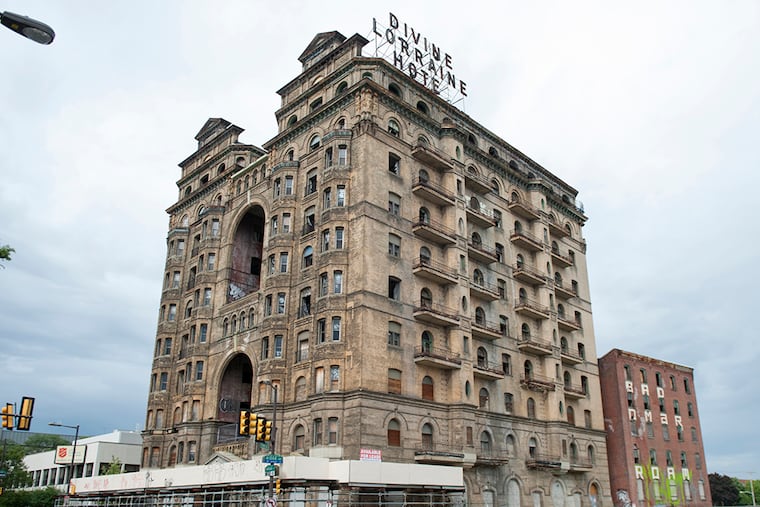Divine Lorraine will end apartment leases and revert back to being a hotel, management tells tenants
The property managers emailed residents that their leases are not up for renewal, as the building plans to become a “managed hotel property” in the “coming months.”

The Divine Lorraine Hotel is going back to its roots.
The iconic North Broad Street building, which reopened as mostly apartments in 2017 after a $44 million renovation, will be reverted back to a “managed hotel property,” building manager EB Realty told residents in an email this week.
Developer Eric Blumenfeld, who owns the building, did not respond to text messages requesting an interview, and the building’s leasing manager did not return phone calls.
The emails were first reported by Billy Penn.
The 130-year-old Victorian-style building is one of the most well-known in the city, towering 11 stories over North Philadelphia with a massive red luminescent sign bearing its name.
Built in 1892, it was heralded as the first luxury high-rise apartments by architect Willis G. Hale and became a hotel eight years later. George Baker, who called himself Father Major Jealous Divine of the International Peace Mission Movement, bought the tower in 1948. It became one of the first racially integrated hotels in the United States.
» READ MORE: Risky makeover of Divine Lorraine takes another step forward
Divine died in 1965, and for the next 34 years, it served as headquarters for his movement, with the lower levels serving as an affordable dining space for the public.
In 1999, the building closed, and sat vacant for 16 years. Though the building’s terra cotta tile flooring kept it from rotting, it became a popular spot for trespassers and graffiti artists, and a symbol of blight along the North Philly corridor.
In 2012, Blumenfeld bought the building for about $2.1 million plus $800,000 in debt. Blumenfeld envisioned the space as housing restaurants, shopping, hotel rooms, and rentals. He invested $44 million in renovations, and in early 2017, renters moved in.
Five years later, EB Realty Management Corp. — headed by Blumenfeld — told residents that their leases are not up for renewal, as the building plans to become a “managed hotel property” in the “coming months.” It did not specify a timeline.
At least 24 units are currently used as hotel rooms, which run for about $385 per night for a two-bedroom suite.
The building’s website says 91 of the 101 one- and two-bedroom apartments, which cost about $1,800 per month, are occupied. Cicala, a high-end Italian restaurant, is on the ground floor.
It’s unclear if the building will contract a hotel group to manage the property, or rent the units as Airbnbs. Public records show that in March, the building received a commercial building permit, and plumbing permits to install at least 10 new kitchen sinks and bathrooms. The plans submitted with those permits are not publicly available.
Blumenfeld co-invested in a $58 million renovation of the Metropolitan Opera House, now operated as the concert venue The Met, in 2013 and maintains a controlling stake in the property.